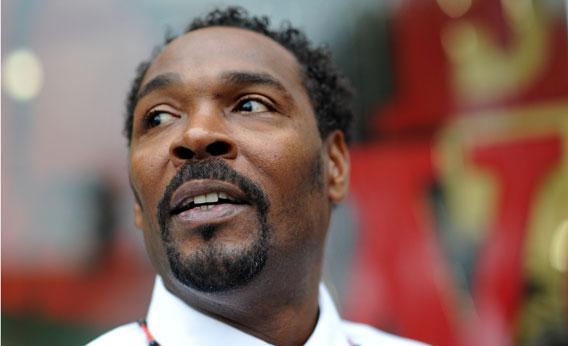Rodney King, whose videotaped beating by Los Angeles police officers in 1991 incited deadly riots, was found dead in a swimming pool this weekend by his fiancée, Cynthia Kelly. The couple met when Kelly was a juror on King’s civil suit against the city of Los Angeles. Are plaintiffs allowed to hook up with jurors?
Not until the trial is over. Once a jury is discharged, there are no legal restrictions limiting interaction between jurors and the participants in a case. But during a trial, be it criminal or civil, jurors aren’t allowed to communicate with lawyers, judges, plaintiffs, defendants, or witnesses outside of the courtroom. If a plaintiff or defendant and a juror do begin dating during a trial—or even flirt, as reporters observed in John Edwards’ criminal trial last month—then a lawyer or bailiff may bring an allegation of juror misconduct to the judge. The judge could let the behavior go unpunished, or issue a warning to the juror, or discharge the juror from the trial and appoint an alternate in his or her place. Egregious misbehavior could earn the juror a citation for contempt of court, which can result in fines or jail time.
Even if a judge discovered that a juror had developed romantic feelings for a plaintiff during a trial and that the crush affected his or her verdict, the case wouldn’t be overturned. Judges don’t reopen a case unless strong evidence of misconduct comes to light, such as phone records indicating that a juror took bribes. The fact that Rodney King and Cynthia Kelly first went out the day after King’s trial ended might indicate that they harbored feelings for each other during the trial, but feelings are not sufficient grounds for the judge to act. Besides, it’s expected that a jury will have some sort of emotional reaction to the plaintiff and defendant; over the course of the trial, jurors will probably come to like and dislike the individuals involved in the case to varying degrees. If the judge discovered that love notes had been passed between King and Kelly during the trial, however, that could be grounds for an overturned verdict.
Romantic relationships between jurors and plaintiffs (or defendants) are rare—or, at least, they rarely come to light. In a 2005 civil suit against Ford Motor Co. in South Texas, the plaintiff’s lawyer had a long-standing relationship with one of the jurors, which Ford didn’t find out until several days into the trial—but the judge responded by replacing the juror with an alternate rather than declaring a mistrial. A juror and a defense barrister began dating immediately after the conclusion of an unlawful killing case in East Yorkshire, England in 2000, but a judge declined to overturn the verdict, because the pair had refrained from contact during the trial (even though the juror appeared “infatuated,” according to the lawyers mounting the appeal). In Scotland in 2004, a court declined to hear the appeal of a murder convict who pointed out that two of the jurors on his trial had had sex with another man accused in the same murder case.
Got a question about today’s news? Ask the Explainer.
Explainer thanks David Levine of the University of California Hastings College of the Law.
